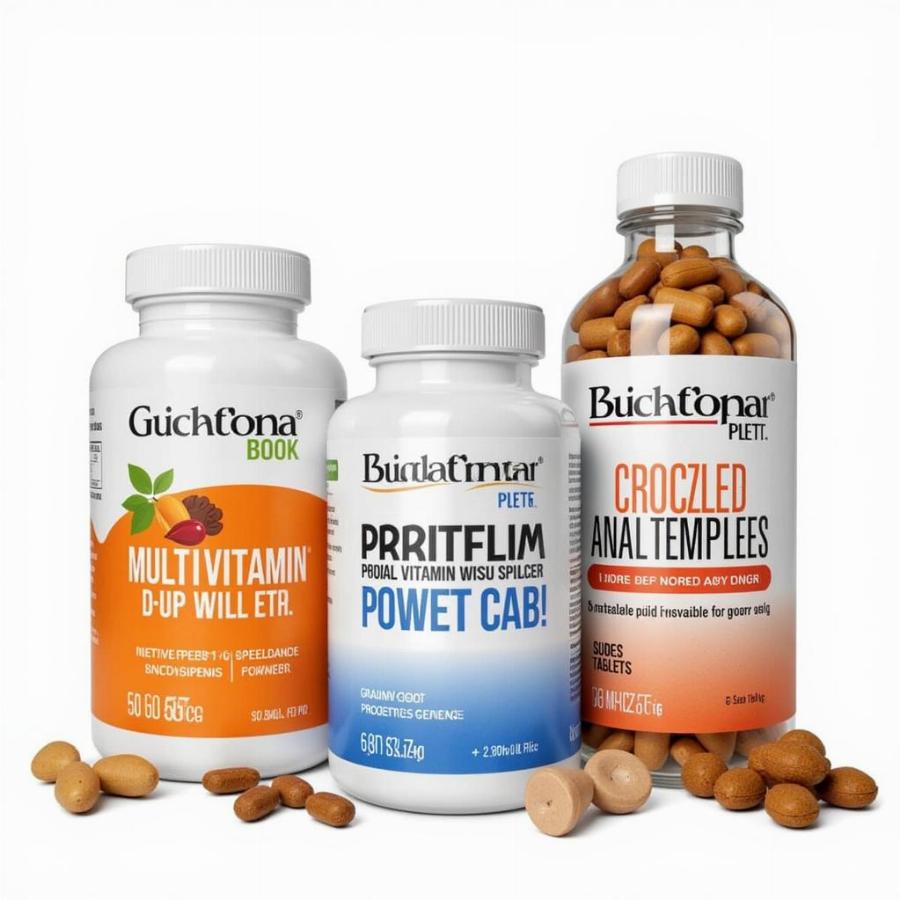As dog lovers, we want to give our furry companions the very best, and that includes a healthy diet. But in a world of kibble, canned food, and homemade meals, it can be tricky to know if we’re meeting all of their nutritional needs. This naturally leads many owners to ask: are multi vitamins for dogs really necessary?
While a complete and balanced diet is the foundation of a dog’s health, the truth is, multi vitamins can play a beneficial role in supporting their overall well-being. Just like humans, dogs require a variety of vitamins and minerals to thrive. These essential nutrients support everything from healthy growth and development to a strong immune system and optimal organ function.
Understanding Your Dog’s Nutritional Needs
Before we delve into the world of multi vitamins, it’s essential to understand the basics of canine nutrition. Dogs need a specific balance of:
- Proteins: The building blocks for healthy muscles, tissues, and organs.
- Fats: Provide energy, support cell function, and aid in nutrient absorption.
- Carbohydrates: Another source of energy that also provides fiber for digestion.
- Vitamins: Essential for a variety of bodily functions, including metabolism, immune response, and cell growth.
- Minerals: Support bone health, fluid balance, nerve function, and more.
A high-quality commercial dog food formulated for your dog’s age, breed, and activity level will typically provide most of these nutrients.
When Multi Vitamins for Dogs Can Be Beneficial
While a good diet goes a long way, there are certain situations where multi vitamins for dogs can be particularly helpful:
- Picky Eaters: If you have a dog who’s a picky eater and you struggle to get them to eat a balanced diet, a multivitamin can help fill in potential nutritional gaps.
- Homemade Diets: While rewarding, preparing your dog’s food at home requires careful planning to ensure nutritional completeness. Multi vitamins designed for homemade diets can provide an added layer of assurance.
- Health Conditions: Certain health conditions, such as allergies, digestive issues, or recovery from surgery, can increase a dog’s need for specific nutrients.
- Senior Dogs: As dogs age, their bodies become less efficient at absorbing nutrients. A senior formula multivitamin can help support their changing needs.
Choosing the Right Multivitamin for Your Dog
The world of dog supplements is vast, so how do you choose the right multi vitamin?
- Consult Your Veterinarian: This is always the most important step. Your vet can assess your dog’s individual needs and recommend a product that’s safe and effective.
- Look for High-Quality Ingredients: Choose a multivitamin from a reputable brand with clearly listed ingredients and minimal fillers or artificial additives.
- Consider Your Dog’s Life Stage and Lifestyle: Puppies, adult dogs, senior dogs, and working dogs all have different nutritional requirements.
- Choose the Right Form: Multi vitamins come in various forms, including chews, tablets, powders, and liquids. Select a form that your dog finds palatable and easy to take.
 Different Forms of Dog Multivitamins
Different Forms of Dog Multivitamins
Potential Risks of Multi Vitamins for Dogs
While generally safe, there are some potential risks associated with multi vitamins for dogs:
- Overdosing: Giving your dog too many vitamins can be harmful. Always follow the dosage instructions on the product label and consult your vet.
- Interactions: Some vitamins and minerals can interact with certain medications. Again, always check with your vet before giving your dog any new supplements.
- Allergies: Some dogs may be allergic to certain ingredients in multi vitamins. Watch for any signs of allergies, such as itching, digestive upset, or facial swelling.
A Holistic Approach to Your Dog’s Health
Multi vitamins for dogs can be a valuable tool in supporting your furry friend’s overall health, but they are not a substitute for a complete and balanced diet or regular veterinary care. By focusing on a holistic approach that includes high-quality nutrition, regular exercise, mental enrichment, and a strong bond with you, you can give your dog the best chance at a long, happy, and healthy life.
Frequently Asked Questions About Multi Vitamins for Dogs
1. Can I give my dog human multi vitamins?
No, you should never give your dog human multi vitamins. Human formulations can contain ingredients that are toxic to dogs.
2. How do I know if my dog is getting enough vitamins?
A healthy diet should provide most of the vitamins your dog needs. If you have any concerns, it’s best to consult with your veterinarian.
3. What are the signs of vitamin deficiency in dogs?
Signs of vitamin deficiency can vary depending on the specific vitamin but may include poor growth, skin problems, digestive issues, and lethargy.
4. Are there any specific vitamins I should avoid giving my dog?
It’s essential to avoid giving your dog any vitamins without consulting your veterinarian. Some vitamins, like vitamin D, can be toxic in high doses.
5. Can I give my dog multi vitamins if they are already eating a balanced diet?
It’s generally not necessary to give multi vitamins to dogs who are eating a complete and balanced diet. However, there may be exceptions, so it’s always best to discuss it with your vet.
Need More Advice on Dog Nutrition?
For more information on dog food for specific breeds like pitbulls or insights into brands like Life’s Abundance and Victor, check out our other helpful articles:
You can also find guidance on supplements for homemade dog food and affordable wet food options:
About Beaut Dogs
Beaut Dogs is your trusted source for all things dog-related. We provide reliable, helpful, and in-depth information about the wonderful world of dogs. Whether you’re looking for breed-specific guides, nutrition advice, or training tips, we’re here to help you give your furry friend the best life possible. For personalized support, reach out to our experts at [email protected].